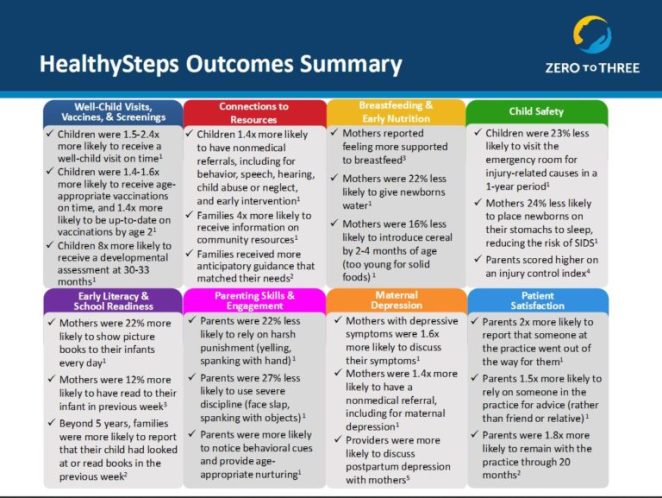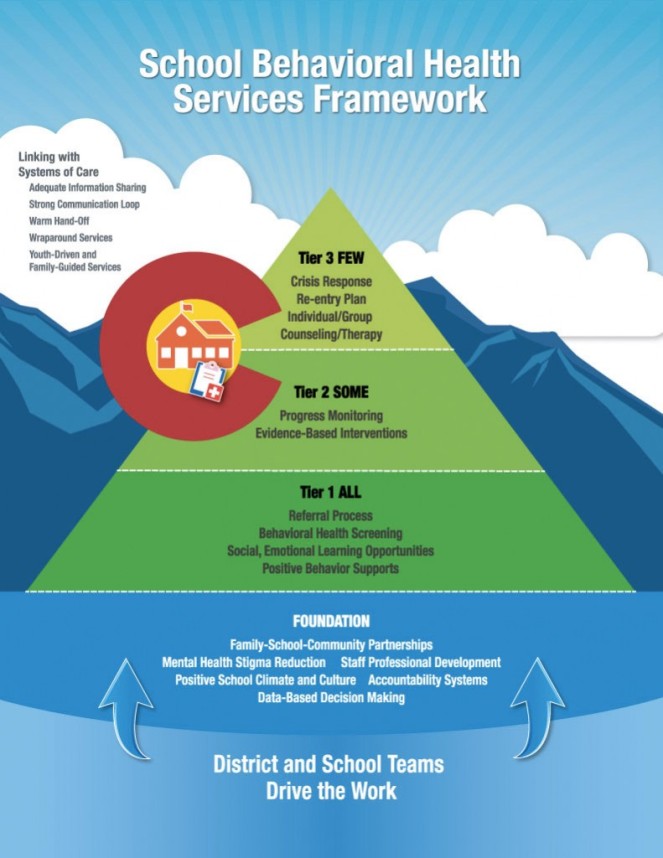Healthy Step Initiative: In pediatricians’ offices
The Healthy Steps Initiative is a primary care-based approach to promoting healthy early development in children1. Pediatric care teams work on this through guidance on effective parenting, screening for developmental, behavioral, and emotional health, providing appropriate resources and referrals, and promoting healthy parent-child bonding. A program of Zero to Three, Healthy Steps is currently at 109 pediatric care sites in 15 states and provides care to 26,000 children each year. Evidence for this program has been garnered through a randomized controlled, clinical trial, longitudinal study, and quasi-experimental study, the results of which can be viewed below:

Image courtesy of Zero to Three, 2017
Southwest Human Development: In the community
A non-profit organization located in Arizona, Southwest Human Development is dedicated to promoting mental health and future success through healthy early child development programs2. This community-based approach uses programs such as the Birth to 5 Helpline, Nurse-Family Partnership, and the Good Fit Counseling Center to improve developmental and mental health outcomes. The Good Fit Counseling Center provides parents of children under the age of five with access to psychologists and therapists to help with a variety of concerns such as fussiness or sleep problems3. Services are charged for based on sliding fee scales or insurance/AHCCCS (Arizona’s Medicaid) reimbursement. Southwest Human Development also coordinates donations and volunteers for putting up Little Free Libraries around the Phoenix area to promote early literacy.

Image courtesy of Southwest Human Development
The Colorado Education Initiative: In schools
The Colorado Education Initiative is a non-profit organization that collaborates with Colorado’s Department of Education to support the success of students throughout the state. One of their efforts at improving student life is through providing the Colorado Framework for School Behavioral Health4. This is a framework for providing behavioral health services to students using a 3-tiered approach which serves the whole school while also providing targeted interventions to students with greater mental health needs.

Image courtesy of Colorado Education Initiative, 2017
This is an evidence-based approach to providing prevention, early intervention, and support for students’ behavioral health needs. The focus on prevention is provided through Positive Behavioral Interventions and Supports and Response to Intervention while interventions and support are provided through a System of Care. The school and district work in collaboration with both school-based and local community-based behavioral health professionals to provide services to students and their families as needed. They also work together to provide prevention and early intervention measures such as stigma reduction efforts. Early identification is also addressed through this framework in the form of universal behavioral health screening as a part of tier 1. A toolkit for selecting an appropriate universal behavioral health screener is provided as a resource by CEI.
1Healthy Step (2016). What is Healthy Steps? Retrieved from healthysteps.org
2Southwest Human Development (2017). Childhood development and mental health. Retrieved from https://www.swhd.org/programs/health-and-development/
3Southwest Human Development (2017). Good Fit Counseling Center. Retrieved from https://www.swhd.org/programs/health-and-development/good-fit-counseling/
4Colorado Education Initiative (2017). Colorado framework for school behavioral health. Retrieved from http://www.coloradoedinitiative.org/resources/schoolbehavioralhealth/#.UzXt4vldV8E

I loved your discussion on the innovative and progressive concept of the Colorado Framework for School Behavioral Health from the Colorado Education Initiative that genuinely attempts to incorporate behavioral health into the school setting. The multi-tiered approach addresses the “interventions” available based on the level of the student’s need (Colorado Education Initiatve [CDI], 2017). In the universal approach for all students, one element of this system of care focuses on positive behavioral supports with clear and consistent expectations, as opposed to the historical approach of control/punishment (CDI, 2017). Additionally, the framework recommends the integration of emotional learning, universal health screening, and maintaining formal referral processes if there is an identified problem (CDI, 2017). That first tier seems to truly align with your vision that I can ascertain from your blog postings! At the second tier, evidence-based measures are implemented in the school setting and there is integration into the school day of progress monitoring for students in need. Finally, the third tier has an incredible approach including therapy during the school day, re-entry programs for students returning from longer-term active treatment, and establishment of a crisis response plan (CDI, 2017). From my perspective, this is an extremely innovative approach that could transform the school system into a healthier place in terms of behavioral management and mental health! To me, this framework attempts to prevent or better address what would have historically been “problem children” (i.e., changing the mindset of punishment to using clear and consistent boundaries). I think this framework and approach is an incredible resource for us all!
Colorado Education Initiative (2017). Colorado framework for school behavioral health: Multi-tiered system of supports. Retrieved March 19, 2017, from http://www.coloradoedinitiative.org/resources/schoolbehavioralhealth/#.UzXt4vldV8E
LikeLike
As a provider in the field of mental health, it was inspiring for me to read your blog and become more familiar with the private sector efforts toward early intervention and prevention specific to behavioral health. Over the course of the last 15 years in practice, I have become more intimately familiar with the need to intervene early…so as to improve the overall patient outcome potential. Interestingly enough, my Master’s thesis focused on the development of a tool to aid in identification of prodromal schizophrenia. Though this concept is old in regards to literature, it is unfortunate that practice and procedure specific to the topic has not evolved significantly within that timeframe.
In order to harness the knowledge available and implement change, frameworks are necessary to guide the evolutionary process. There is a wealth of knowledge available regarding the use of frameworks to positively impact pediatric healthcare. For example, Weiss and colleagues demonstrated that application of a three-step framework for implementation of trauma-informed care was effective in targeting attitudes and confidence within the pediatric healthcare network(Weiss et al., 2017). It makes me wonder how various collective efforts might be combined to create a more universal impact in the area of child mental health policy. How do we begin to harness the wealth of literature and create effective and efficient change in a swift manner?
Thank you for your thought provoking post! I will be very interested to see your recommendations regarding this topic in the coming weeks!
References
Weiss, D., Kassam-Adams, N., Murray, C., Kohser, K. L., Fein, J. A., Winston, F. K., & Marsac, M. L. (2017). Application of a framework to implement trauma-informed care throughout a pediatric care network. Journal of Continuing Education of Health Professionals, 37 (1), 55-60. doi: 10.1097/CEH.0000000000000140
LikeLike
It is very unfortunate that practice often does not keep up with what current research recommends especially when it comes to early interventions that could reduce future problems for our clients. Perhaps this will change as more doctorate prepared nurse practitioners enter into healthcare. I’m curious, what tool did you use for identifying prodromal schizophrenia?
LikeLike